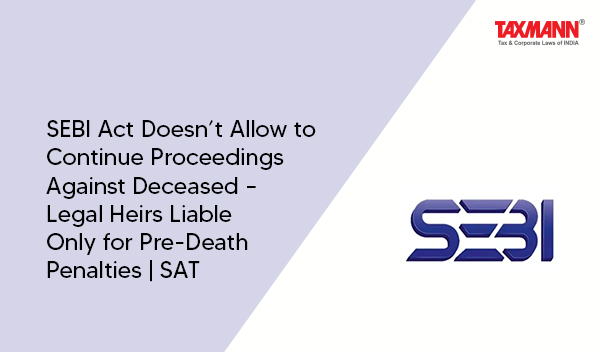SEBI Act Doesn’t Allow to Continue Proceedings Against Deceased – Legal Heirs Liable Only for Pre-Death Penalties | SAT
- Blog|News|Company Law|
- 2 Min Read
- By Taxmann
- |
- Last Updated on 12 October, 2023

Case Details: Y. N. Saxena v. Securities and Exchange Board of India - [2023] 154 taxmann.com 596 (SAT - Mumbai)
Judiciary and Counsel Details
- Justice Tarun Agarwala, Presiding Officer & Ms Meera Swarup, Technical Member
- Anshumaan Sahni, Ms Nupur Shah & Amir Arsiwala, Advs. for the Appellant.
- Sumit Rai, Mihir Mody, Arnav Misra, Ms Shilpa Joshi & Harshvardhan Melanta, Advs. for the Respondent.
Facts of the Case
In the instant case, the company ‘SICCL’ mobilized the public through offer of optionally fully convertible debentures (OFCDs) of ‘SICCL’ and raised a sum of Rs. 14.16 crores from 1.98 crores allottees in violation of the SEBI Act, Companies Act and ICDR Regulations.
SEBI, thus, directed the company and its directors including one ‘Y’ to jointly and severally refund money collected from investors. While passing the said order, SEBI came to know that ‘Y’ had already died, but instead of abating proceedings in so far as ‘Y’ was concerned, upon coming to know of the death of ‘Y’, SEBI further restrained legal representatives of deceased from buying, selling or creating any third party rights of property so inherited by them.
Thereafter, an appeal was made to the Securities Appellate Tribunal (SAT) against the order passed by the SEBI.
The issue which arose for consideration was whether the respondents were justified in recovering the amount collected by the company from a dead person’s property in the form of his estate without there being any provision in the Act. Another question which arose for consideration was whether the proceedings could continue against the legal representative after he is dead under the SEBI Act.
SAT Held
The SAT observed that there is no provision in the SEBI Act to continue proceedings against a dead person or against legal representatives/heirs of the deceased. Further, legal representatives shall only be liable to pay when a penalty has been imposed before the death of an accused person.
The SAT held that such direction was totally perverse and without any authority of law. Thus, the impugned order passed by the SEBI could not be sustained and an appeal against the impugned order was to be allowed.
List of Cases Reviewed
- Shabina Abraham v. CCE & Customs [2015] 61 taxmann.com 95/52 GST 30 (SC) (para 13) followed.
List of Cases Referred to
- Shabina Abraham v. CCE & Customs [2015] 61 taxmann.com 95/52 GST 30 (SC) (para 10),
- CIT v. Ellis C. Reid AIR 1931 Bom. 333 (para 13),
- CIT v. Amarchand N. Shroff 1963 SCR Supl. 1 SCC 699 (para 13) and
- CIT v. James Anderson [1964] 51 ITR 345 (SC) (para 13).
Disclaimer: The content/information published on the website is only for general information of the user and shall not be construed as legal advice. While the Taxmann has exercised reasonable efforts to ensure the veracity of information/content published, Taxmann shall be under no liability in any manner whatsoever for incorrect information, if any.

Taxmann Publications has a dedicated in-house Research & Editorial Team. This team consists of a team of Chartered Accountants, Company Secretaries, and Lawyers. This team works under the guidance and supervision of editor-in-chief Mr Rakesh Bhargava.
The Research and Editorial Team is responsible for developing reliable and accurate content for the readers. The team follows the six-sigma approach to achieve the benchmark of zero error in its publications and research platforms. The team ensures that the following publication guidelines are thoroughly followed while developing the content:
- The statutory material is obtained only from the authorized and reliable sources
- All the latest developments in the judicial and legislative fields are covered
- Prepare the analytical write-ups on current, controversial, and important issues to help the readers to understand the concept and its implications
- Every content published by Taxmann is complete, accurate and lucid
- All evidence-based statements are supported with proper reference to Section, Circular No., Notification No. or citations
- The golden rules of grammar, style and consistency are thoroughly followed
- Font and size that’s easy to read and remain consistent across all imprint and digital publications are applied



 CA | CS | CMA
CA | CS | CMA
